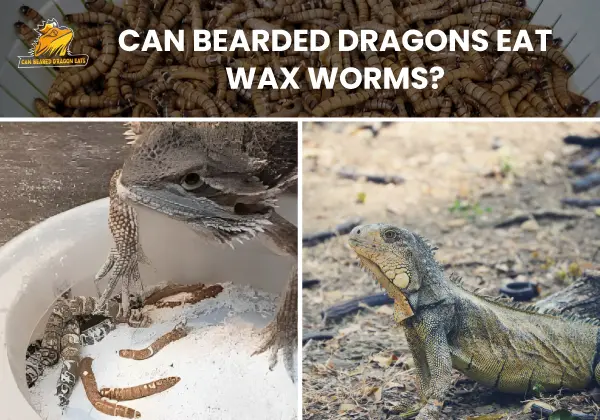Can bearded dragons eat wax worms? Absolutely yes. I have always been fascinated by the world of reptiles, particularly bearded dragons. I have come to learn a lot about their dietary needs and preferences. One of the most interesting things I’ve learned is that waxworms make for an excellent treat for these dragons.
Waxworms can survive for extended periods without food, and when they need to eat, they can easily subsist on cereal grain, bran, and honey. While they are high in fat and can lead to liver problems, they are still an irresistible delicacy for most bearded dragons.
However, I have also heard stories from other keepers who introduced their dragons to wax worms, only to find out that their dragons refused to eat any other type of insect afterward. So, if you plan on giving your bearded dragon this delightful treat, be careful not to get them hooked!
Read more : Can Bearded Dragons Eat Bell Pepper Leaves?
What Are Waxworms For Bearded Dragons?
In the wild, waxworms are a parasitic insect that usually inhabits bee hives and feeds on the beeswax inside the nest. Hence, they are named waxworms. However, bearded dragons, are a nutritious and delicious treat that they simply can’t resist.
Waxworms are an excellent source of protein and essential nutrients for bearded dragons. Not only do they offer a tasty snack, but they also provide a welcome change from the usual diet of crickets and mealworms. So, why not treat your bearded dragon to a few waxworms and see how much they enjoy them?
Are Wax Worms Safe To Feed Baby Beardies?
You may be wondering about the safety of feeding them wax worms. While these insects can be a great source of protein for growing dragons, it’s important to be cautious. Baby and juvenile bearded dragons require more protein than their adult counterparts, and insects should make up a significant portion of their diet.
PRO TIP: It’s crucial to remember that wax worms should not be fed as a staple food. Instead, limit their intake to 3-5 per day, spread out across several feedings alongside other insects. Providing a well-balanced diet ensures that your bearded baby dragon grows up healthy and strong.
Read more : Can Bearded Dragons Eat Pumpkin?
Nutritional Aspects of Wax Worms
Wax worms are incredibly high in protein, with protein content. Protein is essential for your bearded dragon’s growth and development, as it helps to build and repair muscle tissue.
In addition, wax worms are rich in calcium, with the calcium content. Calcium is crucial for your dragon’s bone health and can help prevent the development of metabolic bone disease.
Furthermore, wax worms contain high phosphorus levels, with a phosphorus content. While too much phosphorus can be harmful to your dragon, when balanced with calcium, it can help maintain healthy bones and muscles. Wax worms are also a good source of fiber, which can aid digestion and promote overall gut health.
According to Healthline, Wax worms contain the following nutritional value:
| Phosphorus | 2161ppm |
| Calcium | 283ppm |
| Moisture % | 61.7 |
| Protein % | 15.5 |
| Fiber % | 7.7 |
| Ca:P | 1:8 |
| Ash % | 1.02 |
| Fat % | 22.2 |
How Should I Feed Waxworms To A Bearded Dragon
Feeding your bearded dragon a balanced diet is crucial for its overall health and well-being. Waxworms are popular for owners looking to provide their pets with a tasty and nutritious treat. However, there are some important considerations to keep in mind when feeding waxworms to your bearded dragon.
Selecting Waxworms
When selecting waxworms, it’s important to choose healthy and lively ones. You want to avoid feeding your pet waxworms that appear sluggish, discolored, or unhealthy. This can be a sign that the worms are sick or dying and could potentially harm your bearded dragon.
Feeding Frequency
Waxworms should be fed to your bearded dragon in moderation. While they are a nutritious treat, they are also high in fat and should not be the primary source of food in your pet’s diet. A good rule of thumb is to feed waxworms as a treat no more than once a week.
Preparation
Before feeding your bearded dragon waxworms, it’s important to prepare them properly. Make sure that the worms are alive and moving to stimulate your pet’s hunting instincts. You can also dust the worms with a calcium supplement before feeding them to your bearded dragon to ensure that they are getting enough of this important nutrient.
Portion Control
When feeding waxworms to your bearded dragon, practicing portion control is important. You don’t want to overfeed your pet, as this can lead to obesity and other health issues. A good rule of thumb is to offer at most 2-3 waxworms per feeding, depending on the size of your bearded dragon.
EXPERT TIP: I advise that you choose lively and active waxworms to encourage your bearded dragon’s hunting behavior. However, it’s crucial to avoid overfeeding them, as waxworms are high in fat and can contribute to obesity. Be mindful of the quantity and frequency of waxworms you feed your pet, and balance it with other food sources to maintain a healthy diet.
Can Bearded Dragons Eat Wax Worm? Pros & Cons
Wax worms are a popular food choice for bearded dragons, but they have advantages and disadvantages, like any food.
Here are some pros and cons of feeding wax worms to your beardie.
Pros:
- High in fat: Wax worms are high in fat, which can be beneficial for bearded dragons that need to gain weight or have higher energy needs.
- Soft exoskeleton: Wax worms have a soft exoskeleton, making them easy for bearded dragons to digest, even those with dental or digestive issues.
- Variety: Adding wax worms to your bearded dragon’s diet can provide variety and stimulate their appetite.
Cons:
- High in calcium-to-phosphorus ratio: Wax worms have a high calcium-to-phosphorus ratio, which can be detrimental to bearded dragons if they are fed too frequently or in large quantities.
- Addiction: Bearded dragons can become addicted to wax worms because of their high-fat content, leading to an unbalanced diet and health issues.
- Expensive: Wax worms can be costly compared to other insect options, making them less practical for everyday feeding.
How Many Wax Worms Should I Feed My Bearded Dragon?
The number of wax worms to feed your bearded dragon depends on its age and size. For juveniles, offer 2-3 wax worms a few times a week as a treat. For adults, limit to 1-2 worms weekly, as they are high in fat. Always balance their diet with greens and other insects.
Baby & Juvenile Bearded Dragons
Baby and juvenile beardies require more protein, so insects should make up a larger proportion of their diet. They also tend to eat more frequently than adults but smaller meals at any one time.
If your bearded dragon is under a year old, it should consume a diet of around 70% insects and 30% plant matter. They will need to eat daily, with 3-5 meals per day. As they mature to adulthood, their diet should shift to closer to 70% plant matter and 30% insects.
EXPERT TIP: I recommend cyclical feeding for bearded dragons. This involves alternating between plant and insect feeding days, along with a no-food day in between. By offering wax worms in moderation, you can provide your pet with a balanced and nutritious diet that they’ll enjoy.
Can Bearded Dragons Eat Dead Wax Worms?
Can Bearded dragons eat waxworms that are dead? The short answer is no; it’s not recommended. Bearded dragons are known for their love of live insects, and dead worms won’t appeal to their natural hunting instincts.
While live wax worms wriggle around in their container, dead worms appear black and stiff, which can make them unappetizing to your bearded dragon. Feeding your beardie dead worms also carries health risks as you don’t know what killed them.
EXPERT TIP: I suggest choosing lively waxworms to stimulate your bearded dragon’s natural hunting instincts. Don’t go overboard with feeding waxworms, as their high-fat content can cause obesity.
What Kind Of Worms Should You Feed Your Bearded Dragon?
When it comes to feeding your bearded dragon, mealworms can be a great source of protein. However, it’s essential to choose the right type.
Large mealworms, such as superworms, tomato worms, and ringworms, are popular, but it’s important to note that they can carry parasites. If you’re looking for a safer option, consider feeding your dragon giant mealworms sprayed with juvenile hormones.
Adult bearded dragons only require five to six mealworms per day, which can be easily found at pet stores or online retailers. By choosing the right worms for your dragon, you can provide a balanced and nutritious diet to keep them healthy and happy.
Where Can You Buy Wax Worms For Your Bearded Dragon?
Wax worms are widely available at most pet stores that carry live feeders. You can also find them at online retailers that specialize in reptile supplies. Purchasing wax worms from a reputable source is important to ensure they are healthy and free from harmful pesticides or chemicals.
Furthermore, store them properly to ensure their longevity and freshness. You can offer your bearded dragon a tasty and nutritious treat as part of a well-balanced diet by providing your bearded dragon with high-quality wax worms.
Read more : Can bearded dragons eat blueberries?
FAQS
When to Feed Wax Worms to a Bearded Dragon
Wax worms should be fed to bearded dragons as an occasional treat rather than a staple food source. One or two wax worms a week is sufficient, and they should be offered in moderation, especially for adult bearded dragons.
How long do wax worms stay alive?
Wax worms can live for up to 8 weeks, depending on the conditions they are kept in. They require a cool and dry environment to prolong their lifespan.
Conclusion
Wax worms can be a tasty and easily digestible treat for bearded dragons, but they should be fed in moderation due to their high-fat content. While they are suitable for all ages of bearded dragons, there are other worms with better nutritional profiles, such as hornworms, butter worms, and silkworms. It’s important to choose worms that are appropriate for your bearded dragon’s size and never feed them that are larger than the space between their eyes. Other worms, like super worms, may be more difficult to digest and should be avoided if your bearded dragon has health concerns.
- Eastern Bearded Dragon - July 26, 2024
- Why Do Bearded Dragons Bob Their Heads? - July 25, 2024
- Everything You Need to Know About Paradox Bearded Dragons - July 10, 2024

